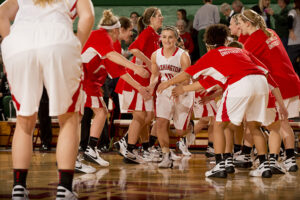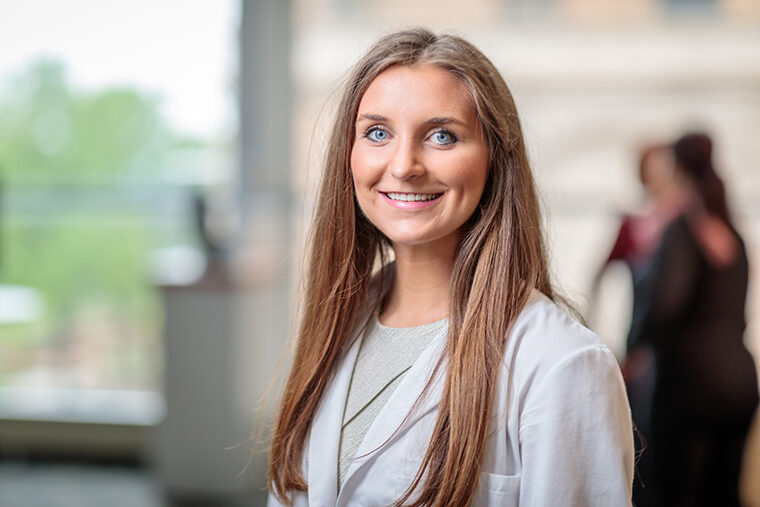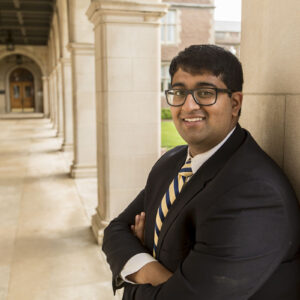Alexandra Keane’s professional pathways always have pointed to Washington University in St. Louis.
The Kansas native deemed it the best place to earn undergraduate degrees from Arts & Sciences in chemistry and biology. The School of Medicine beckoned her to pursue her lifelong dream of becoming a physician.
“My education at Washington University was second to none,” said Keane, a doctor of medicine candidate who will represent graduate students May 17 as a speaker at the universitywide Commencement ceremony. “I can confidently say that I would not be in the same career position if I had attended another university.”
Throughout her eight years here, Keane has received numerous academic honors — including serving as the class president for the Alpha Omega Alpha Honor Medical Society as well as receiving prestigious fellowships to research nerve injuries. She also spent five years as a point guard for Washington University’s women’s basketball team, perennially one of the NCAA Division III’s top teams.
Keane’s academic and college athletic experiences also have inspired her four younger siblings, all of whom will be enrolled at Washington University during the 2019-20 school year. She will continue her university affiliation as a resident in plastic surgery at Barnes-Jewish Hospital.
“Our whole family loves Washington University,” Keane said.
What does it mean for you to be selected to represent graduate students at Commencement?
I am honored to have been selected. During my time at Washington University, I have been involved in many aspects of the university, from academics and research to women’s athletic programs to advocacy as a graduate student representative to the Board of Trustees. I’ve done this with the goal of propelling the work of the university forward while advancing and improving the experiences of my peers. This allows me to view Washington University through a wide lens. I hope to deliver a Commencement address that resonates with the Class of 2019.
Can you talk about how your education has shaped your career path?
Owing to familial diseases, I knew I wanted to be a physician from a young age. My interest in plastic surgery was inspired as a first-year medical student during a lecture about peripheral nerve injury and surgical reconstruction in an anatomy class. The speaker was Susan E. Mackinnon, MD, director of the Division of Plastic and Reconstructive Surgery [and the Sydney M. Shoenberg Jr. and Robert H. Shoenberg Professor of Surgery]. With great enthusiasm, she provided a glimpse of her pioneering work in nerve-transfer surgery that has helped restore arm and leg function to many patients who have suffered devastating peripheral nerve injuries.
Dr. Mackinnon’s work prompted my desire to delve deeper into the field in both the research and clinical settings, and I have been inspired by plastic surgeons’ creativity, innovation and commitment to restoring patients’ form, function and quality of life.
How do surgery and sports complement each other?

The dynamics and values upheld on surgical teams are similar to those upheld on the basketball court. During the first stages of basketball training, I quickly learned two fundamental values that are essential to success, both of which are critical in surgical training: perfecting fundamental skills and being coachable.
As I progressed in my basketball career, I learned the values of hard work, teamwork, discipline, selflessness, physical and mental stamina, resilience and leadership. As a point guard, I learned that I must lead by example, communicate effectively, remain calm under pressure, and make quick, clear decisions in pivotal moments, all of which are important for a career in surgery. I hope the values I learned through my years in athletics will be reflected in my drive, work ethic and diligence as I pursue my passion for plastic surgery.
You mentioned the importance of being coachable. What is your mentoring experience?
From my high school basketball trainer to my WashU basketball coaches, and from my high school chemistry teacher to my clinical and research mentors in plastic and reconstructive surgery at WashU, I have been fortunate to be supported by talented, invested and generous coaches, mentors and sponsors. I owe my athletic and professional successes to them.
Mentorship — a relationship built on guidance and support — is important. However, sponsorship — a relationship in which the sponsor puts their reputation on the line to propel a sponsee’s career forward — is critical for shaping a successful career, particularly the careers of women pursuing fields traditionally dominated by men. As a basketball coach to local fourth-grade girls for almost the past year and as a mentor to younger students, I strive to embody the qualities of those who influenced my athletic and professional career, and I will continue to make a concerted effort to mentor and sponsor the young women and men who come after me.
What’s it like to have your siblings here?
I share many similarities with my sister, Grace, who is finishing her second year of medical school. We have the same passions within medicine, research and hobbies. We are involved in similar medical student groups, and we conduct basic science research in complementary labs within the Division of Plastic and Reconstructive Surgery. We also co-coach a fourth-grade girls’ basketball team, and we live together. This allows us to be quite productive while having a lot of fun.
I’ve enjoyed having my siblings here. In the fall, my sister, Camille, and my brother, Michael, will be seniors in the Olin Business School; and Ingrid, the youngest Keane sibling, will be a freshman in the College of Arts & Sciences and a player on the women’s basketball team.
My sisters, brother and I are fortunate to have the opportunity to obtain our education at a world-class institution.

